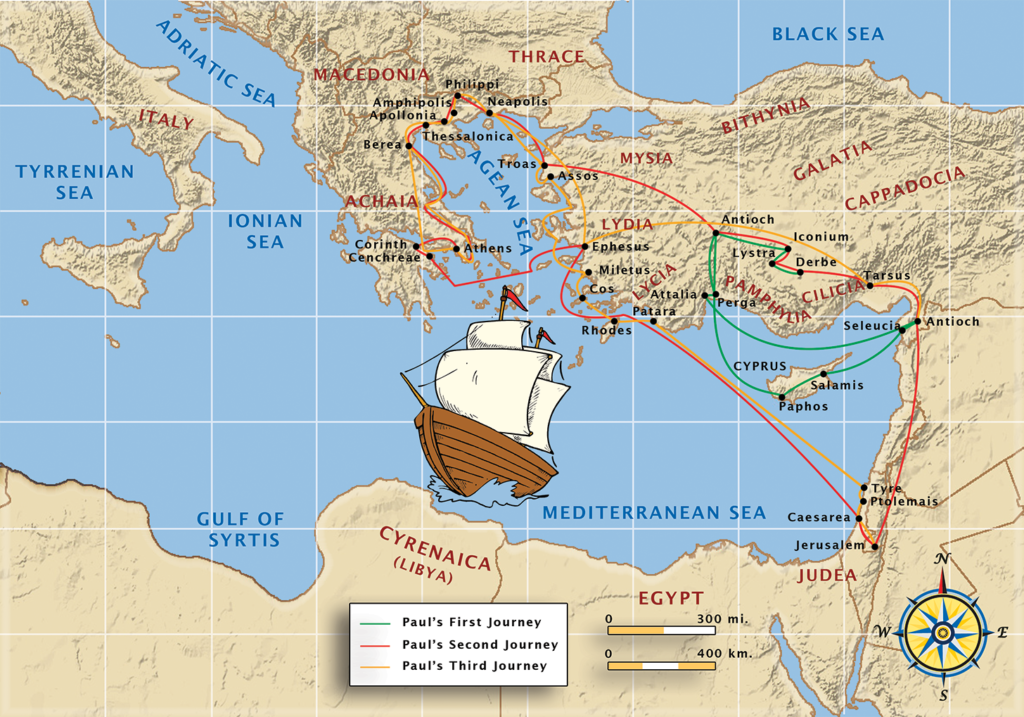The Apostle Paul
The Apostle Paul
Imagine if the world’s leading atheist, who had written books against God, Jesus, and the Bible for many years, suddenly had a change of heart and became a Christian. Such an event would be big news. Atheists would most likely write articles talking about what a huge mistake the person had made, while Christians would talk about how excited they were that this person came to know and understand the truth. Christians would point to this person’s conversion as an example of how the Gospel has the power to change the hearts of those who, in the past, were enemies of God.


When we look in the Bible, we see an example of one of the most remarkable conversions in all of human history. In about A.D. 40 there was a Jew named Saul. Saul was a member of a sect known as the Pharisees. This special group prided themselves on knowing God’s Law in the Old Testament. In fact, it is reported that they valued the Old Law so much that in order to be a Pharisee, a person had to memorize, word-for-word, the first five books of the Old Testament—Genesis, Exodus, Leviticus, Numbers, and Deuteronomy. Not only was Saul a Pharisee, but he became one of the most well-known Jewish leaders of his time (Galatians 1:14).


When Saul heard about Jesus, he was angry. Jesus claimed to be the Messiah and the Son of God. Saul did not believe Jesus was God’s Son. Saul believed Jesus was a liar who was convincing people not to follow the Old Law anymore. On one occasion, a Christian named Stephen preached a powerful Gospel sermon about how Jesus is God’s Son and how the Jewish nation rejected Him. The Jews in the audience were so angry that they dragged Stephen out of their city and killed him by throwing stones at him (Acts 7:54-60). Not only was Saul with the crowd of wicked men who stoned Stephen, he was glad they stoned him and stood watch over their coats while they killed him (Acts 7:58).

Saul became one of the most vicious enemies and persecutors of Christians. He threw many Christians into prison. When they were put on trial, he voted that they should be killed. He would “compel them to blaspheme,” which most likely means that he tortured them or caused them emotional or physical pain to make them say they did not believe that Jesus is God’s Son. Saul said, “I myself thought I must do many things contrary to the name of Jesus of Nazareth” (Acts 26:9). The whole church knew that Saul was a wicked and cruel enemy of Jesus.
In his zeal to harm Christians, he obtained letters from the chief priests in Jerusalem to persecute and imprison Christians in other cities. He planned to travel to Damascus, capture Christians in that area, and carry them back to Jerusalem to be tried, and most likely put to death. While he was on the road to Damascus, however, something amazing happened to him. Jesus appeared to Saul and asked him why he was persecuting Jesus. At first, Saul did not know it was Jesus and he said to Him, “Who are you, Lord?” Jesus responded, “I am Jesus, whom you are persecuting” (Acts 9:1-6). Saul immediately knew he had made a terrible mistake. He knew Jesus was the Messiah, the Son of God, and he asked Jesus what He wanted Saul to do. Jesus told him to go into the city of Damascus and someone would tell him what to do.
Jesus then appeared in a vision to a man named Ananias. He instructed Ananias to go and tell Saul what he needed to do in order to get right with God. Ananias did not understand. He knew that Saul was a cruel persecutor of Christians. Why did Jesus want him to visit Saul? Jesus explained that He had plans for Saul (Acts 9:10-19). So, for three days, Saul was blind from seeing Jesus on the road. He waited for someone to come and tell him what he needed to do. Finally, Ananias came to Saul and said to him, “Why are you waiting? Arise and be baptized and wash away your sins, calling on the name of the Lord” (Acts 22:16). Saul obeyed Ananias. He received his sight, and he began preaching that Jesus is the Christ, the Messiah.


You can imagine how people reacted to Saul’s conversion. After he began to preach about Jesus, the Jewish leaders who formerly worked with him were furious. The more they listened to him preach about Jesus, the angrier they became. On several occasions, they tried to kill him (Acts 9:23). On the other hand, the Christians were not sure about his conversion. They were still afraid of him and thought his conversion was fake, and he was just trying to infiltrate their churches and do them harm. Thankfully, a Christian named Barnabas, whose name means “Son of Encouragement,” trusted Saul. Barnabas took Saul to the Apostles, and they realized that his conversion was real and that he was a Christian just like they were.
Not long after his conversion, Saul began to be known by his other name—Paul. You may know him as the Apostle Paul. God used Paul to accomplish wonderful things.
First, God sent Him into many foreign countries to preach and teach that Jesus is the Son of God. Thousands of people responded to the Gospel message and became Christians. He established many churches throughout the world. Second, the Holy Spirit inspired Paul to write 12 books of the Bible, which is almost half of the books of the New Testament. Many of the “books” are letters that he wrote to the churches where he had traveled and preached.
Paul’s story is an example of how powerful the Gospel of Jesus Christ is. Paul once wrote that he was “the chief of all sinners” (1 Timothy 1:15). He persecuted Christians and had many of them killed. Yet the power of Jesus’ blood was able to forgive Paul, just like it is able to forgive all those who believe in and obey Jesus.
By the end of Paul’s life, he had suffered greatly because of his preaching about Jesus. The Jews had whipped him five times, with 39 lashes each time (for a total of 195 lashes), he had been beaten with rods three times, he had been stoned, shipwrecked, and thrown in prison on a number of occasions (2 Corinthians 11:22-33).



Yet, in spite of the pain Paul endured, he stated that all the suffering we experience here on Earth is light (or insignificant) compared to the glory we will receive in heaven (2 Corinthians 4:16-18). Near the end of Paul’s life, he explained to the church at Philippi that he had a desire “to depart and to be with Christ.” Because of his faithful service to Jesus, he was excited to leave this earthly life and be with Christ forever. Like Paul, we should all determine to live a faithful life of service for Jesus so that one day we will get to stand with Paul and hear our Lord say to us, “Well done, good and faithful servant…. Enter into the joy of your Lord” (Matthew 25:23).


REPRODUCTION & DISCLAIMERS: We are happy to grant permission for this article to be reproduced in part or in its entirety, as long as our stipulations are observed.






0 Comments:
Post a Comment
<< Home